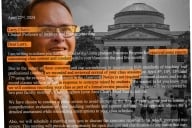You have /5 articles left.
Sign up for a free account or log in.
Carthage College’s full-time faculty members have overwhelmingly censured their president, John R. Swallow, and their provost/executive vice president for operations, David Timmerman, for increasing teaching loads without upping pay.
The Wisconsin liberal arts college has 143 full-time faculty members, said Nancy Reese, the Academic Senate president there. Anthony Barnhart, a tenured associate professor of psychological science and part of a separate faculty group that’s been advocating for contract faculty, said Wednesday’s vote was 94 to 14 for censure, with eight abstentions.
Barnhart said the college’s courses are already four credit hours instead of the usual three. Contract, tenure-track and tenured faculty are currently expected to teach three courses each fall and spring, plus one course each January term, save for a break each third January.
According to Barnhart, Timmerman told tenured and tenure-track faculty members in August that their teaching loads would increase next fall to a constant seven courses per academic year, while contract faculty would have to teach a constant eight.
“Now, all of these contract faculty are being told that there is really no room for scholarship or service—that you are full-time teachers,” Barnhart said. He said that equals “their job descriptions changing in real time, with no change in compensation.”
A college spokeswoman wrote in an email that this “plan is not an uncompensated increase but instead a reallocation of faculty time to devote more time to teaching, which is Carthage’s primary mission. The announcement of the teaching load increase included a commitment to reviewing all other elements of faculty work.”
She also provided a statement from the college calling the plan “a measured, incremental step needed to ensure Carthage can continue to provide an exceptional education to our students at an affordable cost and offset the anticipated decline in the number of college-aged students.”
A censure is a symbolic public statement of disapproval, less serious than a no-confidence vote.
“We have not lost confidence,” Barnhart said. “We are still hopeful that the administration will bring the faculty into the fold.” He said he wants officials to let faculty members use their expertise to form an approach to provide the college financial stability without harming education.
Reese said, “We’re optimistic to find a plan to move forward and healthy pathways so that we can have a strong learning community for the future.”








